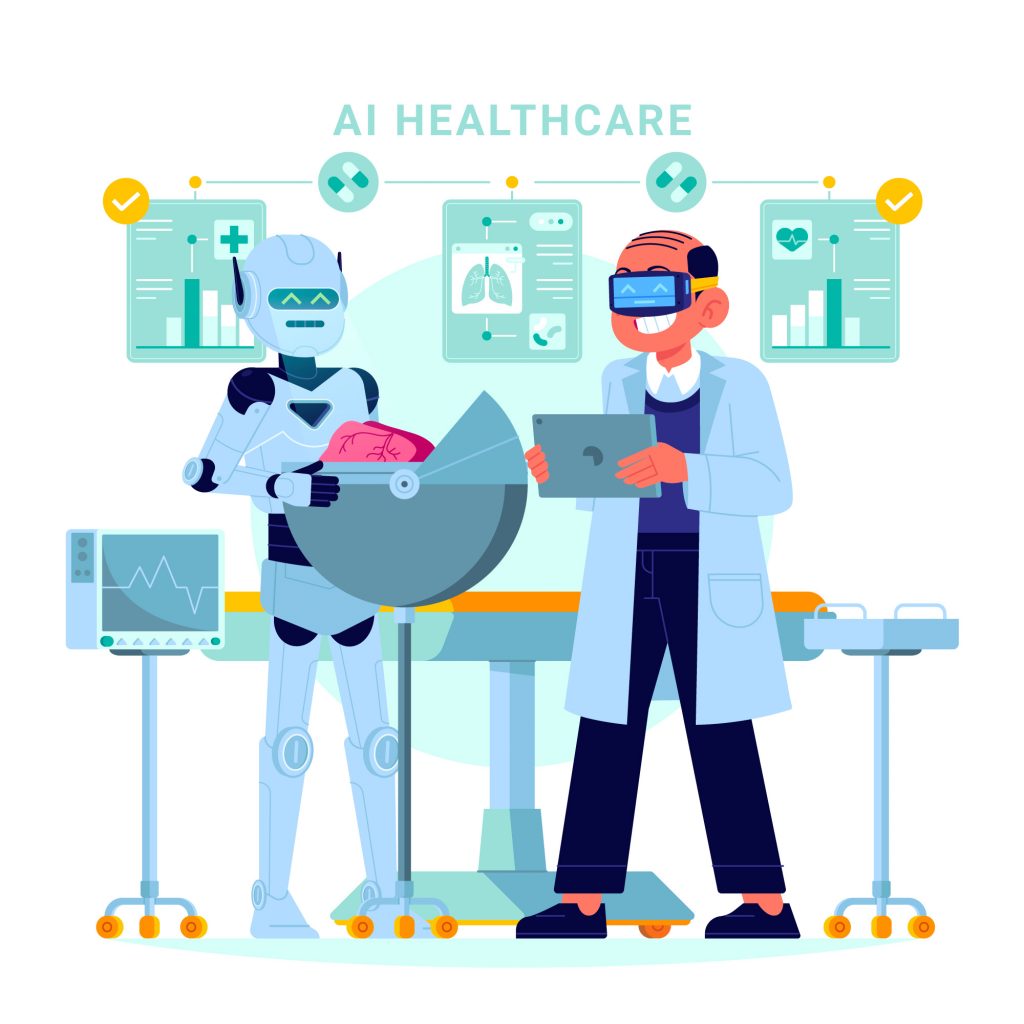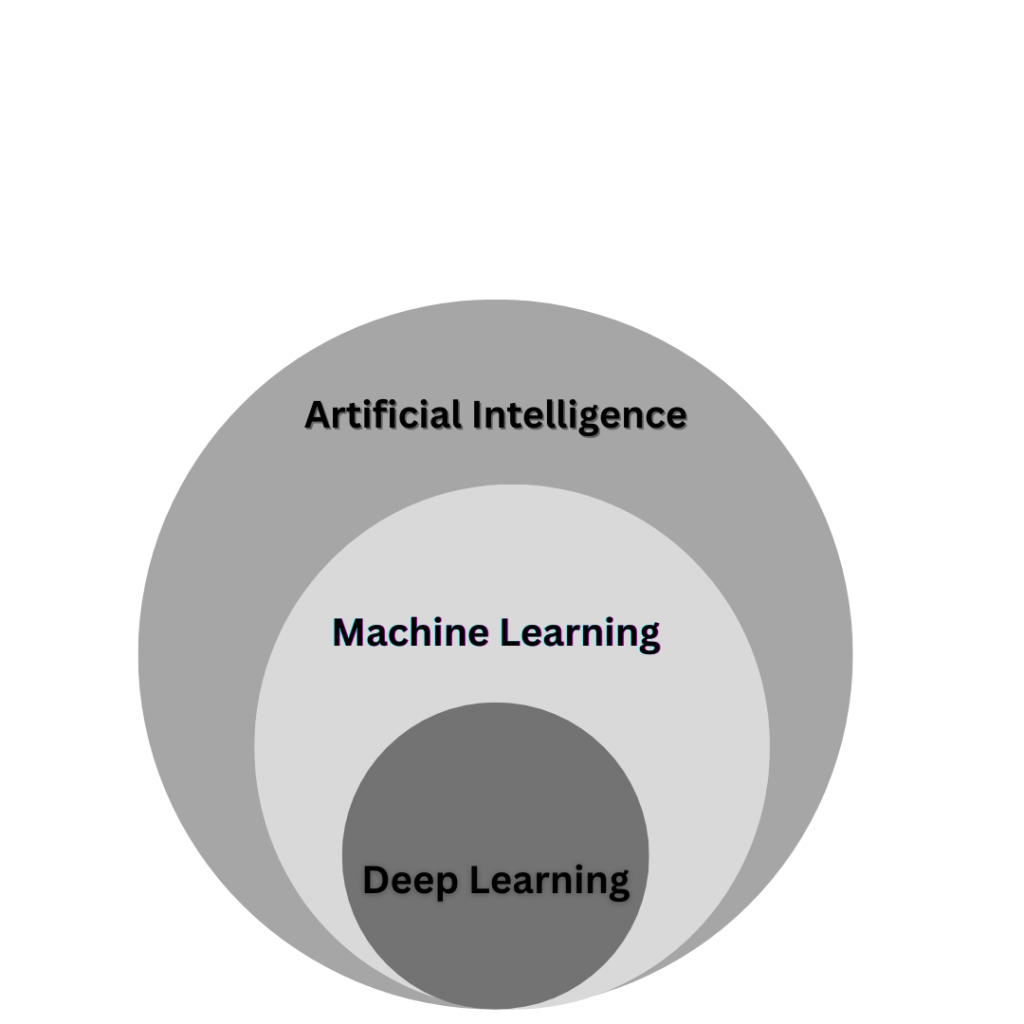AI and ML to Hospitals and Pharmaceuticals

AI and ML to Hospitals are changing how the health sector performs.
AI is artificial intelligence, and we all believe that anything artificial is unhealthy! But though AI is artificially induced intelligence. However, AI and ML have a positive impact on all communities.
Healthcare is one of the least adaptable communities.
Yes, we all worry when we go to a new doctor, hospital, or AI robot to operate on our loved ones, don’t we?
The entire AI community believes that adopting new technologies like artificial intelligence (AI) to transform hospitals and pharmacies is the need of the hour.
Today in this blog, you’ll explore the impact of AI on healthcare, from diagnostic advances to operational efficiencies. You’ll learn about real-world examples and examine both the positive and negative impacts, as well as privacy issues and ethical considerations.
AI giant in the healthcare sector
Artificial intelligence (AI) is now more than just a buzzword. AI and ML to Hospitals are more than just a buzz needed for detecting and treating patients efficiently.
It is a transformative force in healthcare. As we explore the landscape of AI applications in the medical field, it is important to understand the differences between AI, machine learning, and deep learning.

AI covers a broader spectrum than its counterparts. In machine learning, a subfield of AI, algorithms are trained using data, where the adage “more data, better results” applies. Deep learning, a relatively new field, relies on artificial neural networks and, like its counterparts, requires extensive data for algorithm training.
With the further integration of AI technologies, companies need to weigh up the computing costs, especially in the training phase. Despite the progress, computing resource considerations are still relevant.
AI in everyday life: Cases from the real world
A groundbreaking advance in the field of ophthalmology: AI-supported robotic laser vision correction. The success rates of this operation are high and the time required is very short. In India, LASIK is performed in 1.21 minutes with the help of AI.
AI changing Healthcare services
The impact of AI in healthcare is profound. Consider the plight of patients with rare diseases, where AI diagnoses can significantly reduce the time, effort, and money required to make accurate diagnoses.
In India, a global center for diabetes, there is an urgent need for the detection of diabetic retinopathy, which affects millions of people with visual impairment. In a pioneering move, Sankara Eye Hospital has partnered with Leben Care and introduced the cloud-based platform Nethra AI. This collaboration aims to address the shortage of ophthalmologists in rural areas and ensure fast and accurate diagnoses. Nethra AI is becoming a beacon to democratize advanced healthcare and pioneer the fusion of technology and eye care in India. Stay tuned for more insights into this transformative journey.

Future AI changing Healthcare services
The role of AI in healthcare goes beyond its immediate benefits. Although some argue that its impact won’t drastically reduce costs immediately, innovative healthcare organizations are using AI to decentralize care units and streamline administration. The decisions consumers make every day outside of acute care can be positively impacted by AI, ultimately impacting patient health and healthcare costs.
Here are some concrete examples of AI in healthcare in India:
SigTuple’s AI platform helps pathologists and radiologists identify diseases quickly and accurately from medical images.
Niramai has developed a wearable AI-powered device for early detection of breast cancer.
Qure.ai’s AI algorithms help doctors diagnose and interpret X-rays and other types of medical images.
PharmEasy’s AI-based app connects users with pharmacies and provides seamless medical deliveries.
HealthifyMe’s digital health and wellness platform uses AI to help users lose weight, manage chronic diseases, and improve their overall health.
AI and ML to Hospitals- Nursing and Managerial Assistance
The healthcare sector, which is often overloaded with paperwork, is undergoing a digital transformation through the integration of AI. Chatbots have emerged as an effective means of communication in hospitals and encourage interaction with patients and families.
Apollo Hospitals, a well-known healthcare chain in India, has taken a significant step forward with the launch of ProHealth, an innovative AI-driven preventive health profiling program. This pioneering initiative uses a predictive AI algorithm to assess a patient’s health status and predict potential risks.
ProHealth at Apollo Hospitals is the first program to use cutting-edge AI technology to manage and predict health conditions proactively. By capturing basic health data, the predictive algorithm helps identify potential risks and enables timely interventions and personalized preventive measures.
In a landscape where healthcare is increasingly adopting AI applications, Apollo Hospitals’ ProHealth program sets a precedent for using technology to improve preventive healthcare strategies. This initiative not only demonstrates the hospital’s commitment to innovation but also highlights the evolving role of AI in shaping the future of healthcare in India.
This example underscores the application of AI in healthcare in India.
AL and ML to Hospitals Opportunities and Setbacks.
Opportunities

Improved disease treatments: AI applications, as exemplified by IBM Watson, are improving medical research and treatment. From accurate data for high blood pressure patients to algorithms that diagnose rare DNA-based diseases, AI supports medical staff and improves precision and efficiency.:
Improved patient engagement: Health coaching apps for smartphones such as Noom use AI to encourage healthier habits. Patient involvement in their treatment process is becoming crucial. Well-informed patients who are educated about the benefits of AI are more likely to participate in AI-powered treatment plans actively.
Reducing medical errors: AI assisting with colonoscopy examinations and developing intelligent systems will improve diagnostic accuracy. Radiologists benefit from AI support, This allows them to focus on meaningful patient interactions and avoid potential medical errors.
Operational efficiency and cost reduction: AI-driven systems streamline diagnostic processes and replace traditional methods. From tablet cameras for stomach cancer screenings to bone marrow exams, AI is creating efficiencies and reducing medical costs.
Increased productivity and creation of new jobs: The role of AI in increasing productivity is obvious. The success of health coaching apps like Noom leads to job creation. AI contributes to job creation by recognizing the human touch in healthcare and creating positions that bridge the gap between technology and patient care.
Nursing and Managerial Assistance cost: reducing the paperwork for management making the smooth flow of the organization. Nursing and managerial assistance is obtained from AI without error, making decision-making easy.
Lower healthcare costs: AI applications predict significant cost savings, totaling $52 billion in the U.S. by 2024. The focus on data-driven disease prevention and personalized care contributes to improved quality of life and lower medical costs.
Challenges
Accountability of system use: Determining responsibility for AI-related errors is complex. Ethical considerations and social agreements should set the framework for accountability, with a focus on collaboration between system developers, hospitals, and medical staff.
AI gap: Patient trust is critical, and the transition to AI-driven care requires overcoming the ‘AI divide’. Building trust in AI systems requires effective communication from healthcare providers about the benefits of AI for better care.
Cybersecurity concerns: Data privacy issues arise due to the extensive use of data in AI. It is important to strike a balance between using data for advancements and protecting patient privacy. Ethical standards and regulations should govern AI technology and ensure responsible use.
Loss of corporate control: The evolving healthcare landscape integrating AI technologies is challenging traditional management control. The dynamic, connected system requires a shift to collaborative, expert-dependent governance for optimal patient care.
Job loss and transformation challenges: The potential of AI to replace repetitive tasks is a cause for concern. However, retraining and continuing education programs can prepare the workforce for AI-driven healthcare. Creating curricula that combine medical expertise with technology-related courses is critical to fostering a skilled, adaptable workforce.
In addressing these opportunities and challenges, healthcare providers, technology experts, and policymakers must work together to ensure the responsible integration of AI that benefits both patients and the healthcare industry.
First Floor Health Tech Services is at the forefront of this transformative journey, bridging the gap between technology and compassionate patient care, we are employing Future AI to your Health and pharmaceuticals efficiently. Book an appointment to upgrade your Health and Pharma business reach us on contact@firstfloor.agency